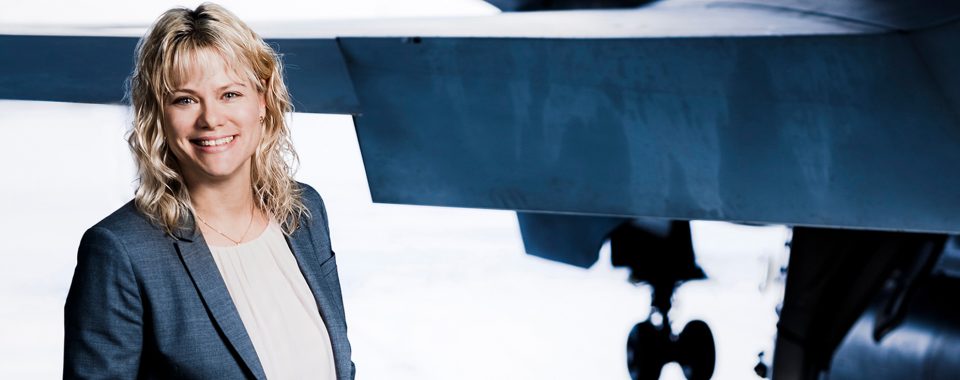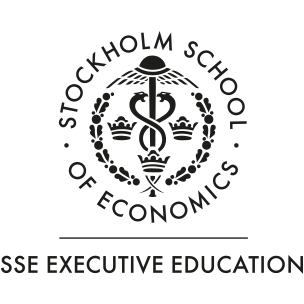
The TIO program prompted a journey of personal development
We interviewed Ellen Molin, Head of Business Area Support and Services at Saab. As Senior Vice President, she is also a member of Saab’s Management Group. Ellen participated in the TIO – International Executive Program at SSE Executive Education in 2016, back when she was Head of the Gripen Support Program.
TIO – International Executive Program (TIO) is a development program for executives who work in complex international organizations. TIO is a consortium program, which means it is produced in close collaboration with a group of businesses from different industries that feel they have shared interests, creating a forum where their leaders can learn from each other and gain insights from industries other than their own. For each round of the consortium program, the businesses nominate the leaders whose development they want to invest in.
Ellen on her role and duties at Saab:
As Senior Vice President and Head of Business Area Support and Services, I lead my own business area and also work as part of Saab’s Group Management team. This makes the role extremely varied and stimulating. I have many different meetings with people all over Sweden and abroad, as we have operations and customers in a wide range of locations.
Good leadership and sound values are the cornerstones of my job, because I lead a team and because the organization has to be able to act independently within the various parts of the business. My task is to ensure that the business has the requisite conditions in place for every employee to be able to succeed. The job also requires a good capacity to prioritize and plan – an ability to identify what is important and to make things happen. We also have to maintain a focus on the long-term perspective at work every day. With many strategic meetings in my schedule, I need to be good at managing strategy issues.
Ellen on her experience of the TIO program:
What immediately springs to mind is networking and personal development, with a focus on economics, innovation, and international business. We began each day with reflections in groups and there was time for implementation and reflection in between modules. An integral part of the program was working on real-world issues, which you could try putting into practice between the modules, before giving other participants support and receiving support yourself in the next module. I think this is the best way to absorb these kinds of lessons. I also felt the blocks hung together well.
“The personal journey that the program started was important – giving me new insights, tools, models and tips. Participation in the TIO program also came at exactly the right moment in my career and my life.”
Ellen on the program’s consortium format:
I feel the companies that were represented in addition to Saab were good and relevant. There were some good discussions among the participants, and there was a lot of give and take between us. It was easy to find similarities in our structures and interfaces – like Saab, the other consortium companies were large, well-established businesses that need to have certain formalities and structures in place. Businesses aren’t actually all that different – they all face challenges concerning decision-making and the rhetoric involved, how best to combine areas of expertise and what digitalization and globalization do to that mix. We talked a great deal about the value proposition – what value we added.
The similarities between the participating businesses led to openness and high levels of recognition in the discussions. On the other hand, differences can also be stimulating and a different make-up might have brought more breadth to the debate. Irrespective of the kinds of businesses involved, there was a benefit in not having too many companies represented, as it allowed us to drill down deep in the group discussions and reflections – which were a major feature of the program format.
Ellen on what she took away from the program:
In addition to my personal development journey and the new tools and models, the big picture from the whole program was my real take-away. And the network – I’m still in touch with other participants and those of us who’ve been able to have met up a few times since the program.
“You create a sense of trust when you take a course like this. The fact that everyone has agreed to full confidentiality creates a willingness to discuss issues and challenges openly.”
I felt so strong when I came back to work. It was important to keep addressing the issues we had tackled on the program, to create space for and build on the lessons in the everyday context of the business. When you return after a course, it’s easy to slip back into the way you did things before. But the work on real, relevant issues made it quite easy to incorporate what I’d learned into the organization.
Did you have any concerns before the program?
No. I was keen and thought it would be fun. I had prepared by minimizing the work that needed to be done while I was away, and I’d briefed the relevant colleagues and other parties.
“Of course I did wonder what kind of people I was going to meet on the program. They turned out to be capable and smart, with exciting experience and to a large extent similar interests and motivations.”
I had attended other types of leadership programs before, pure leadership courses and courses in areas such as change management, innovation and communicative leadership. However, the TIO program was on a whole other level – in terms of both leadership challenges and interaction with other industries. It was a more comprehensive and international program that represented a high standard in both the academic and business world.
Was it worth the time and investment?
Yes, I think it was. I would absolutely recommend the TIO program to others in similar roles and situations.


